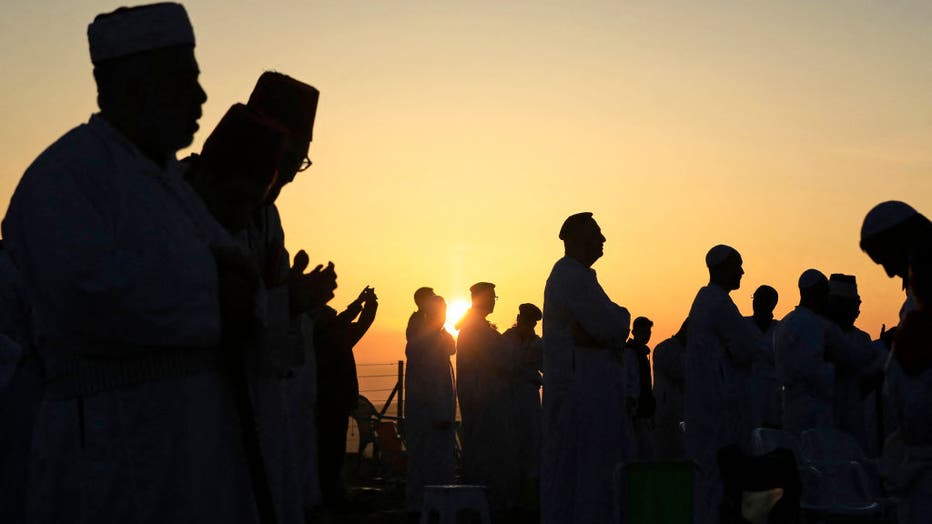War, hostages, antisemitism: A somber backdrop to this year's Passover observances
Passover is a major Jewish holiday, celebrated over seven or eight days each year, commemorating the exodus of ancient Israelites from slavery in Egypt, as recounted in the Bible.
To many Jews, it symbolizes freedom and the birth of a Jewish nation. However, this year, the holiday’s mood will likely be somber due to the ongoing Israel-Hamas war in Gaza, and the rise of antisemitic incidents elsewhere.
Keep reading to learn more about Passover, when it will take place this year and the rituals and traditions associated with the religious holiday.
When is Passover in 2024?
Passover – known as Pesach in Hebrew -- begins on April 22. By tradition, it will be celebrated for seven days in Israel and for eight days by some Jews in the rest of the world.

Samaritan worshipers gather at dawn on May 10, 2023, to pray on top of Mount Gerizim near the northern West Bank city of Nablus, during celebrations of Passover according to their tradition. Samaritans are a community of a few hundred people living i (Photo by ZAIN JAAFAR/AFP via Getty Images)
What are key Passover rituals and traditions?
For many Jews, Passover is a time to reunite with family and recount the exodus from Egypt at a meal called the Seder. Observant Jews avoid grains known as chametz, a reminder of the unleavened bread the Israelites ate when they fled Egypt quickly with no time for dough to rise. Cracker-like matzo is OK to eat; most breads, pastas, cakes and cookies are off-limits.
What's different about Passover 2024?
For many Israelis, it’s hard to celebrate an occasion focused on freedom when some of their compatriots are still held hostage by Hamas in Gaza. The hostages’ plight has reverberated worldwide, with some families in the Jewish diaspora asking rabbis to give them additional prayers for this year’s Seder. Others have created a new Haggadah, the book read during the Seder, to reflect current realities.
Many Seder tables, in Israel and elsewhere, are expected to have empty seats, representing those killed or taken hostage on Oct. 7, as well as soldiers unable to return home for Passover.
There’s also intense concern, in some countries, about a recent rise in antisemitic incidents.
The U.S-based Anti-Defamation League says it tallied 8,873 incidents of antisemitic assault, harassment and vandalism across the country in 2023 – up 140% from 2022 – with most of the incidents occurring after the Oct. 7 Hamas attack on Israel. On Wednesday, the ADL and other Jewish organizations participated in a "Passover Without Fear" webinar, with FBI Director Christopher Wray and several security experts offering guidance on keeping the Passover season safe, secure and as welcoming as possible.
The event was hosted by the Secure Community Network, which provides security and safety resources to hundreds of Jewish organizations and institutions across North America.
"It is not a time for panic, but it is a time for continued vigilance," said Wray, adding that the FBI was particularly concerned about the threat posed by "lone actors."
What are rabbis and scholars saying?
"The Seder is supposed to help us to relive past slavery and liberation from Egypt and to learn its lessons, but in 2024 it must also ask contemporary questions about the confusing and traumatic present and most important, generate hope for the future," said Noam Zion, emeritus member of the faculty of Jewish studies at the Hartman Institute in Jerusalem.
"At the Seder, we make a point of eating bitter herbs, to recall the difficulties of the past, and also drink wine and eat the foods of freedom. It is a mix … a meal filled with discussion that confronts the challenges of being a Jew throughout history and of being a Jew today," said Rabbi Moshe Hauer, executive vice president of the Orthodox Union, a major U.S.-based Jewish organization.
"What a challenging time it is right now for the Jewish people. We feel so alone ... there is so much cynicism in the world, so much hopelessness. "We need Passover now more than ever. It’s a story that ends in freedom and joy," said Rabbi Noah Farkas, president and CEO of the Jewish Federation of Greater Los Angeles.
MORE FOX 13 SEATTLE NEWS
Pygmy goat that went missing from Washington Spring Fair found
Everett mom accused of stabbing her child 41 times charged with his murder
Republican candidate for Washington governor says he is no longer seeking state GOP nomination
Tacoma teacher, pastor accused of 9 counts of molestation faces families of victims
VIDEO: Suspect shot and killed by Seattle Police in Southcenter hotel
To get the best local news, weather and sports in Seattle for free, sign up for the daily FOX 13 Seattle newsletter.
Associated Press religion coverage receives support through the AP’s collaboration with The Conversation US, with funding from Lilly Endowment Inc. The AP is solely responsible for this content.

